中考英语总复习之特殊句型 详解与练习
中考英语特殊句式的技巧及练习题及练习题(含答案)
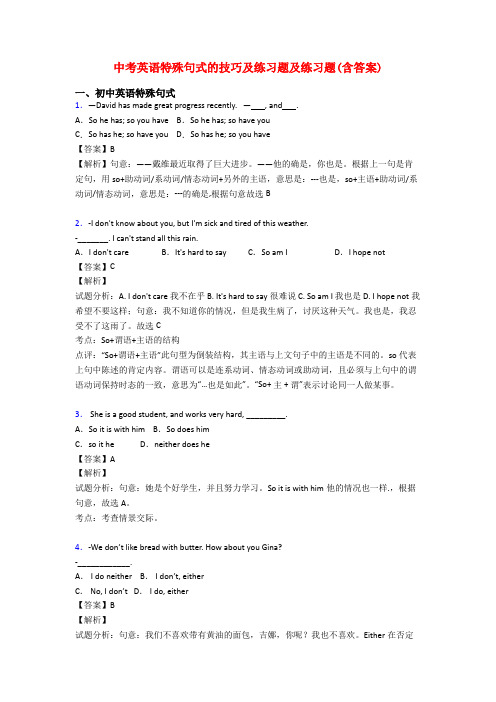
中考英语特殊句式的技巧及练习题及练习题(含答案)一、初中英语特殊句式1.—David has made great progress recently. — , and .A.So he has; so you have B.So he has; so have youC.So has he; so have you D.So has he; so you have【答案】B【解析】句意:——戴维最近取得了巨大进步。
——他的确是,你也是。
根据上一句是肯定句,用so+助动词/系动词/情态动词+另外的主语,意思是:---也是,so+主语+助动词/系动词/情态动词,意思是:---的确是,根据句意故选B2.-I don't know about you, but I'm sick and tired of this weather.-_______. I can't stand all this rain.A.I don't care B.It's hard to say C.So am I D.I hope not【答案】C【解析】试题分析:A. I don't care 我不在乎 B. It's hard to say很难说 C. So am I 我也是 D. I hope not我希望不要这样;句意:我不知道你的情况,但是我生病了,讨厌这种天气。
我也是,我忍受不了这雨了。
故选C考点:So+谓语+主语的结构点评:“So+谓语+主语”此句型为倒装结构,其主语与上文句子中的主语是不同的。
so代表上句中陈述的肯定内容。
谓语可以是连系动词、情态动词或助动词,且必须与上句中的谓语动词保持时态的一致,意思为“…也是如此”。
“So+ 主 + 谓”表示讨论同一人做某事。
3. She is a good student, and works very hard, _________.A.So it is with him B.So does himC.so it he D.neither does he【答案】A【解析】试题分析:句意:她是个好学生,并且努力学习。
英语中考英语特殊句式解题技巧及经典题型及练习题含答案
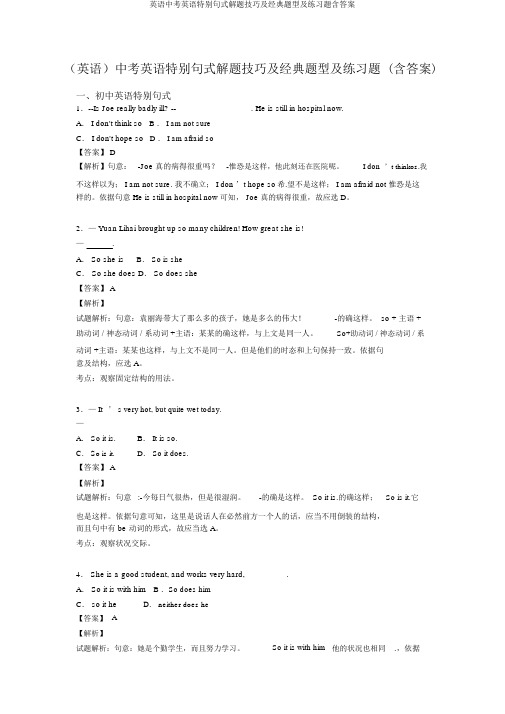
(英语)中考英语特别句式解题技巧及经典题型及练习题 (含答案)一、初中英语特别句式1.--Is Joe really badly ill? -- ________________ . He is still in hospital now.A. I don't think so B . I am not sureC. I don't hope so D . I am afraid so【答案】 D【解析】句意:-Joe 真的病得很重吗?-惟恐是这样,他此刻还在医院呢。
I don’t thinkos.我不这样以为; I am not sure. 我不确立; I don ’t hope so希.望不是这样; I am afraid not 惟恐是这样的。
依据句意 He is still in hospital now 可知, Joe 真的病得很重,故应选 D。
2.— Yuan Lihai brought up so many children! How great she is!—.A. So she is B. So is sheC. So she does D. So does she【答案】 A【解析】试题解析:句意:袁丽海带大了那么多的孩子,她是多么的伟大!-的确这样。
so + 主语 +助动词 / 神态动词 / 系动词 +主语:某某的确这样,与上文是同一人。
So+助动词 / 神态动词 / 系动词 +主语:某某也这样,与上文不是同一人。
但是他们的时态和上句保持一致。
依据句意及结构,应选 A。
考点:观察固定结构的用法。
3.— It’ s very hot, but quite wet today.—_____A. So it is. C. So is it.B. It is so. D. So it does.【答案】 A【解析】试题解析:句意:-今每日气很热,但是很湿润。
-的确是这样。
中考英语特殊句式解题技巧分析及练习题(含答案)
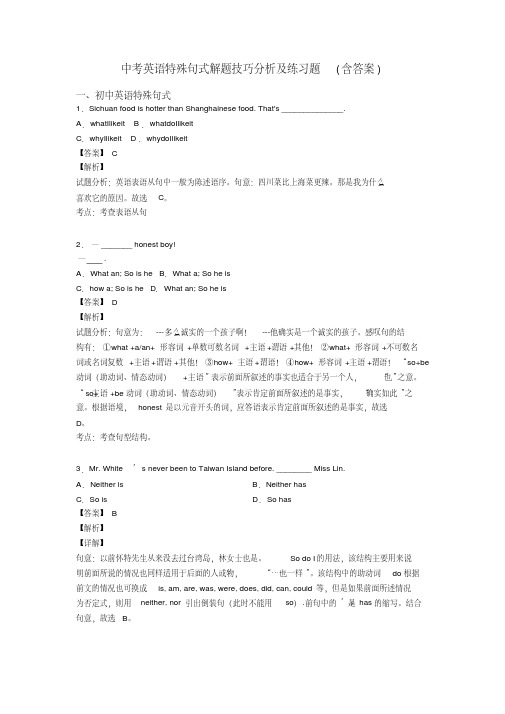
B. So do other students
C. Neither do other students 【答案】 A
【解析】句意: ——先生,对不起,我在这张试卷上做错了那么多。
—— 没关系。其他学
生也一样。这张试卷非常难。 So have other students 其他学生也一样; So do other students
B. So I do
C. So did I
D. So I am
【解析】
【详解】
句意: ——我在吉娜的生日聚会上玩得很开心。 ——我也是。考查倒装句。 so / neither /
nor 表示前面所说的情况也适合于后者,需用 “ so / neither / nor+助动词 +主语 ”这样的倒装句 式。前句 had a great time 是一般过去时,本句助动词需用 did ;根据句意结构,可知选 C。
如此,与上文不是同一人(物)。这些句式在时态上与前一个句子相同。根据上句是一般
现在时,汤姆是第三人称单数,所以借助助动词 【考点定位】考查倒装句。
does,故选 C。
15. — I had a great time at Gina
’ s birthday party.
—________. A. So was I 【答案】 C
A. neither will I
B. so will I
C. neither do I
D. neither I will
【答案】 A
【解析】
试题分析:句意: ——妈妈生病了,今晚我不与你一起去看电影了。
—— 如果你不去的
话,我也不去。 Neither+ 倒装句 “…也不是 ”,因为 if 条件句是一般现在时,主句应该是一般
(英语)初中英语特殊句式常见题型及答题技巧及练习题(含答案)及解析

(英语)初中英语特殊句式常见题型及答题技巧及练习题(含答案)及解析一、初中英语特殊句式1.—Lucy can't go mountain climbing with us tomorrow.—_________ I have to do housework at home.A. So can I.B. Neither can I.C. Neither I can.【答案】B【解析】试题分析:句意:--明天露西不能和我们一起去爬山。
--我也不能去。
我不得不在家里做作业。
So+助动词/情态动词/系动词+主语:某某也如此,与上文不是同一人。
上文是否定句,下文表示某某也不,用 neither +助动词/情态动词/系动词+主语。
这些句式在时态上与前一个句子相同。
根据上句用情态动词can,是否定句,结合句意,故选B。
【考点定位】考查倒装。
2.---Who is the boy ________ is playing football over there?---The one over there? It’s Jim.A. who B. that C. which D. whom【答案】B【解析】试题分析:句意:-在那里踢足球的男孩是谁?-那边的那个吗?是吉姆。
该题为定语从句,先行词是Jim,且主句的主语是疑问词who或which时,引导词用that,故答案选B。
考点:考查定语从句。
3.---I don’t like action films. They are too noisy.--- ________. I never watch action films.A.Neither do I B.Neither I doC.So do I D.So I do【答案】A【解析】试题分析:句意:我不喜欢动作电影,它们太吵了。
我也不喜欢,我从不看动作电影。
Neither+助动词/be动词/情态动词+主语,表示“也不……”,而Neither+助动词/be动词/情态动词+主语,表示“也……”,结合语境故选A。
中考英语总复习∶特殊句式(提高)知识讲解及答案(word)1
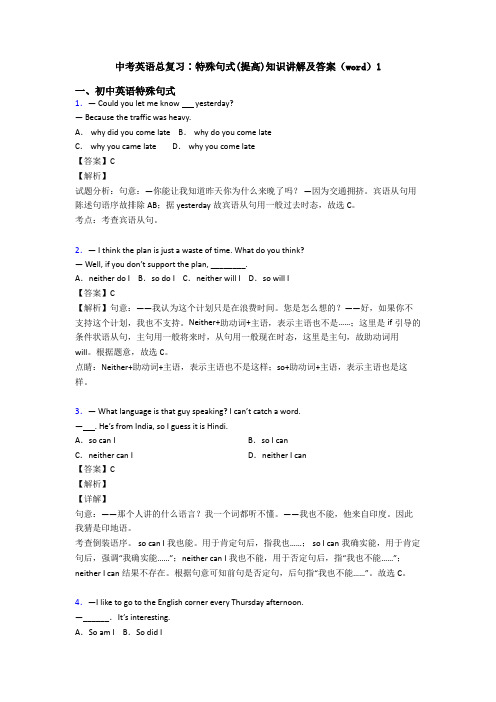
中考英语总复习∶特殊句式(提高)知识讲解及答案(word)1一、初中英语特殊句式1.— Could you let me know yesterday?— Because the traffic was heavy.A. why did you come late B. why do you come lateC. why you came late D. why you come late【答案】C【解析】试题分析:句意:—你能让我知道昨天你为什么来晚了吗?—因为交通拥挤。
宾语从句用陈述句语序故排除AB;据yesterday故宾语从句用一般过去时态,故选C。
考点:考查宾语从句。
2.— I think the plan is just a waste of time. What do you think?—Well, if you don’t support the plan, ________.A.neither do I B.so do I C.neither will I D.so will I【答案】C【解析】句意:——我认为这个计划只是在浪费时间。
您是怎么想的?——好,如果你不支持这个计划,我也不支持。
Neither+助动词+主语,表示主语也不是……;这里是if引导的条件状语从句,主句用一般将来时,从句用一般现在时态,这里是主句,故助动词用will。
根据题意,故选C。
点睛:Neither+助动词+主语,表示主语也不是这样;so+助动词+主语,表示主语也是这样。
3.—What language is that guy speaking? I can’t catch a word.—. He’s from India, so I guess it is Hindi.A.so can I B.so I canC.neither can I D.neither I can【答案】C【解析】【详解】句意:——那个人讲的什么语言?我一个词都听不懂。
(英语)中考英语特殊句式解题技巧及经典题型及练习题(含答案)
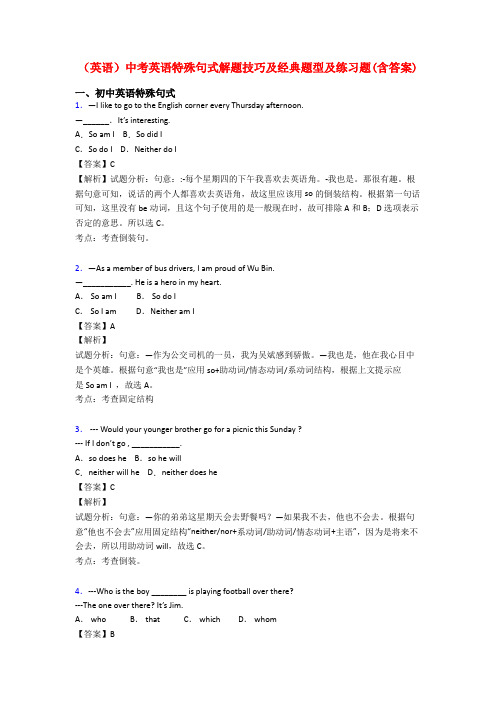
(英语)中考英语特殊句式解题技巧及经典题型及练习题(含答案)一、初中英语特殊句式1.—I like to go to the English corner every Thursday afternoon.—______.It’s interesting.A.So am I B.So did IC.So do I D.Neither do I【答案】C【解析】试题分析:句意::-每个星期四的下午我喜欢去英语角。
-我也是。
那很有趣。
根据句意可知,说话的两个人都喜欢去英语角,故这里应该用so的倒装结构。
根据第一句话可知,这里没有be动词,且这个句子使用的是一般现在时,故可排除A和B;D选项表示否定的意思。
所以选C。
考点:考查倒装句。
2.—As a member of bus drivers, I am proud of Wu Bin.—___________. He is a hero in my heart.A. So am I B. So do IC. So I am D.Neither am I【答案】A【解析】试题分析:句意:—作为公交司机的一员,我为吴斌感到骄傲。
—我也是,他在我心目中是个英雄。
根据句意“我也是”应用so+助动词/情态动词/系动词结构,根据上文提示应是 So am I ,故选A。
考点:考查固定结构3. --- Would your younger brother go for a picnic this Sunday ?--- If I don’t go , ___________.A.so does he B.so he willC.neither will he D.neither does he【答案】C【解析】试题分析:句意:—你的弟弟这星期天会去野餐吗?—如果我不去,他也不会去。
根据句意“他也不会去”应用固定结构“neither/nor+系动词/助动词/情态动词+主语”,因为是将来不会去,所以用助动词will,故选C。
【英语】中考必备英语特殊句式技巧全解及练习题(含答案)
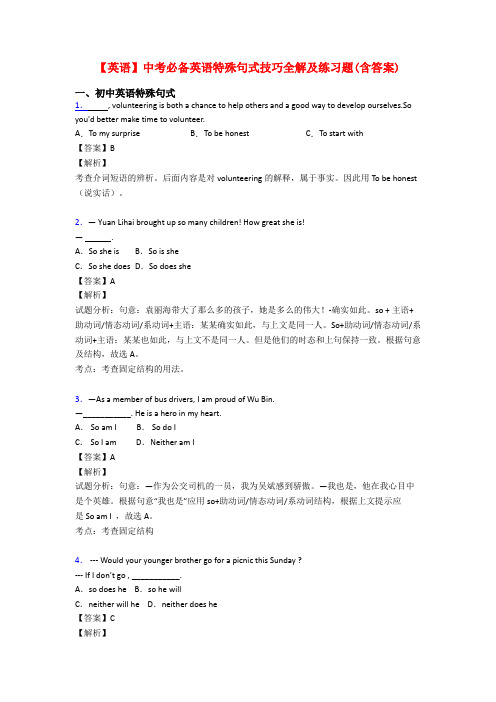
【英语】中考必备英语特殊句式技巧全解及练习题(含答案)一、初中英语特殊句式1. , volunteering is both a chance to help others and a good way to develop ourselves.So you'd better make time to volunteer.A.To my surprise B.To be honest C.To start with【答案】B【解析】考查介词短语的辨析。
后面内容是对volunteering的解释,属于事实。
因此用To be honest (说实话)。
2.— Yuan Lihai brought up so many children! How great she is!—.A.So she is B.So is sheC.So she does D.So does she【答案】A【解析】试题分析:句意:袁丽海带大了那么多的孩子,她是多么的伟大!-确实如此。
so + 主语+助动词/情态动词/系动词+主语:某某确实如此,与上文是同一人。
So+助动词/情态动词/系动词+主语:某某也如此,与上文不是同一人。
但是他们的时态和上句保持一致。
根据句意及结构,故选A。
考点:考查固定结构的用法。
3.—As a member of bus drivers, I am proud of Wu Bin.—___________. He is a hero in my heart.A. So am I B. So do IC. So I am D.Neither am I【答案】A【解析】试题分析:句意:—作为公交司机的一员,我为吴斌感到骄傲。
—我也是,他在我心目中是个英雄。
根据句意“我也是”应用so+助动词/情态动词/系动词结构,根据上文提示应是 So am I ,故选A。
考点:考查固定结构4. --- Would your younger brother go for a picnic this Sunday ?--- If I don’t go , ___________.A.so does he B.so he willC.neither will he D.neither does he【答案】C【解析】试题分析:句意:—你的弟弟这星期天会去野餐吗?—如果我不去,他也不会去。
人教版中考英语中考英语总复习 特殊句式专项讲解及练习
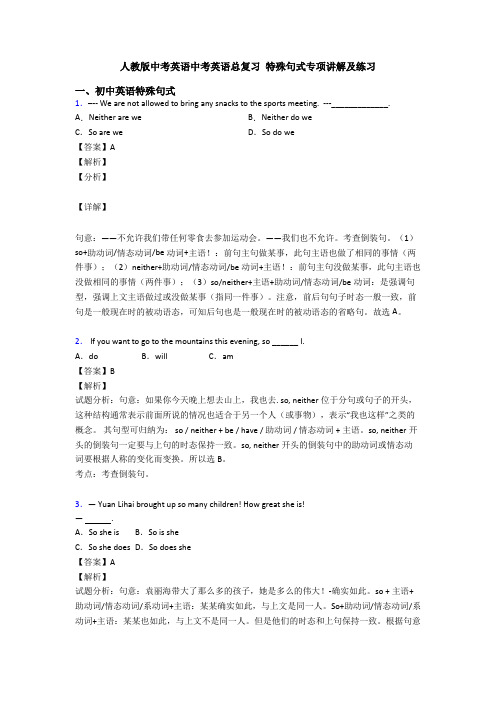
人教版中考英语中考英语总复习特殊句式专项讲解及练习一、初中英语特殊句式1.–-- We are not allowed to bring any snacks to the sports meeting. ---_____________. A.Neither are we B.Neither do weC.So are we D.So do we【答案】A【解析】【分析】【详解】句意:——不允许我们带任何零食去参加运动会。
——我们也不允许。
考查倒装句。
(1)so+助动词/情态动词/be动词+主语!:前句主句做某事,此句主语也做了相同的事情(两件事);(2)neither+助动词/情态动词/be动词+主语!:前句主句没做某事,此句主语也没做相同的事情(两件事);(3)so/neither+主语+助动词/情态动词/be动词:是强调句型,强调上文主语做过或没做某事(指同一件事)。
注意,前后句句子时态一般一致,前句是一般现在时的被动语态,可知后句也是一般现在时的被动语态的省略句。
故选A。
2. If you want to go to the mountains this evening, so ______ I.A.do B.will C.am【答案】B【解析】试题分析:句意:如果你今天晚上想去山上,我也去. so, neither位于分句或句子的开头,这种结构通常表示前面所说的情况也适合于另一个人(或事物),表示“我也这样”之类的概念。
其句型可归纳为: so / neither + be / have / 助动词 / 情态动词 + 主语。
so, neither开头的倒装句一定要与上句的时态保持一致。
so, neither开头的倒装句中的助动词或情态动词要根据人称的变化而变换。
所以选B。
考点:考查倒装句。
3.— Yuan Lihai brought up so many children! How great she is!—.A.So she is B.So is sheC.So she does D.So does she【答案】A【解析】试题分析:句意:袁丽海带大了那么多的孩子,她是多么的伟大!-确实如此。
- 1、下载文档前请自行甄别文档内容的完整性,平台不提供额外的编辑、内容补充、找答案等附加服务。
- 2、"仅部分预览"的文档,不可在线预览部分如存在完整性等问题,可反馈申请退款(可完整预览的文档不适用该条件!)。
- 3、如文档侵犯您的权益,请联系客服反馈,我们会尽快为您处理(人工客服工作时间:9:00-18:30)。
反意疑问句1、什么是反意疑问句英语中,反意疑问句是由陈述句和附在其后的附加疑问句组成。
其中附加疑问句是对陈述句所说的事实或观点提出疑问,起证实作用,一般用于证实说话者所说的事实或观点。
翻译为“是吗”2.反意疑问句的回答,回答时,如果情况属实,用Yes加上反问句的倒装肯定句;若果情况不属实,则用No加上反问句的倒装否定句。
例如You were moved by your students, weren’t you?情况属实:Yes, I were.情况不属实:No, I weren’t.二、反意疑问句中问句部分的动词与陈述部分的动词在语气上成相反的对应关系,即:肯定+否定?否定+肯定?如:①You can’t do it, can you?你不能做它,是吗?②They are very late for the meeting, aren’t they?他们开会迟到了,是吗?三.当陈述句中含有be动词,助动词,或是情态动词时,反问句部分由这些词加上主语人称代词构成,Be动词包括:am, is, are, was, were助动词有:do, does, did, have(用在完成时), has(用在完成时)等情态动词有:can, could, may, might, must, will, would, shall, should 例如:She is a lovely girl, isn’t she?她是一个可爱的女孩,是吗?He will go home, __won’t__ __he__?他要回家了,是吗?She doesn’t l ike to eat popcorn, __does__ _she___?她不喜欢吃爆米花,是吗?The baby won’t sleep early, will it?小宝宝睡得不早,是吗?注意:①He has supper at home every day,doesn’t’t he? (不能用hasn’t he?)他每天在家吃晚饭,是吗?②They have known the matter, haven’t they? (不能用don’t they?)他们已经知道那事情了,是吗?四.当陈述句中只含有行为动词时,若动词加了s,就用does, 若动词为原形,就用do,动词为过去式,则用did,例如:You cleaned your house last week, _didn’t___ __you__?你上周打扫了你的房间,是吗?Your father plays the computer very well, __doesn’t__ ___he _?你父亲电脑技术很好,是吗?They look so happy today, _don’t ___ _they___?你今天看起来很高兴,是吗?五.反意疑问句的陈述部分带有little, few, never, hardly, seldom,nobody, nothing, barely, scarcely等否定意义的词时,问句部分用肯定式。
如:①She never tells a lie, does she?(不用doesn’t she?)她从不说谎,是吗?②He was seldom late, was he?(不用wasn’t he?)他几乎不迟到,是吗?六、反意疑问句的陈述部分为I am……时,问句部分习惯上用aren’t I?表示。
如: I am a very honest man, aren’t I?我是个很诚实的人,是吗?七.陈述部分的主语为不定代词something, anything, nothing, everything 时,问句部分的主语用it。
如:①Something is wrong with the computer, isn’t it?电脑有问题了,是吗?②Nothing has happened to them, has it?他们什么事也没发生,是吗?八、陈述部分的主语为不定代词somebody (someone), anybody (anyone), nobody (no one), everybody (everyone)时,问句部分的主语用he或 they,这时问句动词的数应和he或 they一致。
如:①Someone has taken the seat, hasn’t he?有人已经坐了位置,是吗?②Everyone has done their best in the game, haven’t they?每个人在比赛中已经尽力了,是吗?九.陈述部分为祈使句1)若为let’s引导,反问句用shall we? 例如Let’s go home together, shall we? 让我们一起回家,好吗?2)若为let us引导和其余的任何一般的否定祈使句,都用will you, 例如Let us stop to rest, will you? 让我们停下休息,好吗?Don’t make any noise, will you?别弄出噪音,好吗?3)一般的肯定祈使句则用will you 或won’t you 都行,例如:Do sit down, won’t you?/ will you? 请坐,好吗?You feed the bird today, will you? 今天你喂鸟,是吗?Please open the window, will you? (won’t you?) 打开窗,好吗?十:陈述部分为There (Here) + be + 主语时,问句部分用动词+there (here)?形式。
①There are two cakes on the plate, aren’t there?碟子里有两块蛋糕,是吗?②Here is a story about Mark Twain, isn’t here?这是关于马克吐温的故事,是吗?巩固练习:1. Linda ate nothing this morning, ___?A. didn’t sheB. was sheC. did sheD. wasn’t she2. There’s hardly___ milk in the bottle, _____there?A. no, isn’tB. some, isC. litt le, isn’tD. any, is3. He has never ridden a horse before, ___?A. does heB. has heC. hasn’t heD. doesn’t he4. — He seldom came here, _____?— Yes sir.A. didn’t heB. does heC. doesn’t heD. did he5. Everything seems all right, _____ ?A. does itB. don’t theyC. won’t itD. doesn’t it7. One can’t be too modest, can _____ ?A. oneB. heC. itD. we8. No one failed in the exam, _____ ?A. was heB. did oneC. did theyD. didn’t he10. Neither you nor I am a artist, _____ ?A. am IB. aren’t weC. are weD. am n’t I11. He can’t be her father, _____ he?A. isB. isn’tC. canD. can’t12. They have no time to visit the museum, _____?A. do theyB. haven’t theyC. don’t theyD. will they14. You’d better go at once, _____ you?A. hadn’tB. didC. didn’tD. don’t15. You’d rather work than play, _____ you?A. hadn’tB. wouldn’tC. didn’tD. mustn’t16. You dare not do that, _____ you?A. don’tB. doC. dareD. dar en’t18. He dislikes the two subjects, _____ he?A. doesB. doesn’tC. isD. isn’t19. These tools are useless now, _____ ?A. are theyB. aren’t theyC. is itD. isn’t it20. He used to get up at 6:30, _____ he?A. didn’t heB. did heC. used heD. wouldn’t he22. He ought to win the first prize, _______ he?A. mustn’tB. oughtn’tC. shouldn’tD. Both B and C.23. Let’s go there by bus, ___?A. will youB. shall weC. don’t youD. will you24. Let us go to play football, ___?A. will youB. shall weC. do weD. are we25. Don’t forget to give Polly some food and change her water, ___?A. will youB. shall weC. won’t youD. do you26. —Let’s go shopping this afternoon, _____?— All right.A. will weB. shall weC. don’t weD. are we27. — Pass me the dictionary, _____?— Yes, with pleasure.A. would youB. will youC. won’t youD. wouldn’t you30. There is little water in the glass, ____?A. isn’t thereB. isn’t itC. is itD. is there32. There won’t be any concert this Saturday evening, _____ ?A. will there notB. will thereC. is thereD. won’t33. — I guess she taught herself Japanese, ______?— Yes.A. don’t IB. did sheC. do ID. didn’t she34. I don’t believe you are right, _____ ?A. are youB. do youC. won’t youD. do35. She doesn’t think that Tom sings best in the class, _____ ?A. does sheB. doesn’t sheC. does heD. doesn’t he37. I know you didn’t want to hurt me, _____ ?A. did youB. didn’t youC. do ID. don’t I38. If my father were here he would be very happy, _____ ?A. weren’t heB. were heC. wouldn’t heD. would heKey: 1—5 CDBDD 6—10 BACDC 11—15 AABAB 16—20 CCBBA 21—25CDBAA 26—30 BBBAD 31—35 BBDAA 36—38 AAC感叹句感叹句一般是用来表示说话时的喜悦、惊讶等情感。
